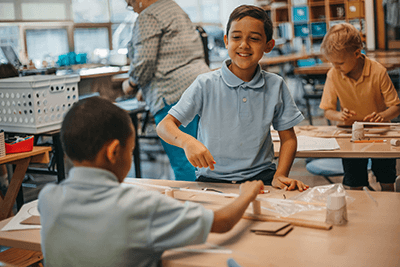April 20, 2023
 from Mark Segal, Upper School director
from Mark Segal, Upper School director
Editor’s Note: Periodically, you will find a guest Head’s Message here from one of MPA’s administrators. We hope you enjoy reading their thoughts and reflections about life at MPA.
In late March of 2016, I vividly remember visiting Mounds Park Academy for the first time. The warm welcome I received from the community was unlike anything that I ever experienced. Very quickly it was clear that the MPA mission was alive, well, and integrated into all aspects of daily life on campus. One aspect, however, stood out more than the other five—the joy of learning. There was a certain joie de vivre felt as soon as I walked through the Lansing Center doors.
Joy is a transformational emotion that can have profound effects on our lives. A feeling of great happiness and pleasure, joy has the ability to uplift our spirits and energize us. The power of joy lies in its ability to shift our mindset from one that is fixed to one that is more open and growth-centric. Joy has a contagious quality and when we share it with others a ripple effect of positivity and happiness occurs. This is witnessed daily at MPA.
In one of the longest studies of adult life, the Harvard Study of Adult Development followed a group of people for 80 years to determine what makes for a “healthy life.” According to the study, “while genes play a certain role, having a sense of community was by far the most influential aspect of leading a joyful life.” In my opinion, MPA weaves these findings into its very ethos.
There is a culture of camaraderie, lived experience, and downright fun across the MPA community, PreK-12. The power of joy in education is immense and it has the ability to transform the way students learn and engage in their academic studies and social interactions.
There are infinite examples of this when thinking about activities that happen in the Upper School that draw out student joy.
- In the Advanced Physics course, students are taught about the design and physical properties of roadway bridges and then are provided specific materials and instructions from which they must build their own model of a bridge. Student collaboration, frustration, and a good amount of trial and error play a large role in this quintessential MPA assignment. Students, however, look forward annually to this project and celebrate joyfully with their peers and onlookers when their final products are “tested” to see how much weight their bridges will hold. Forgotten through the laughter and good natured banter is the amount of time spent working on something with the end goal of breaking it.
- The Upper School also finds ways to experience joy in fun-filled activities that bring us together as a community, outside of the classroom. Recently, we celebrated the first annual Rock, Paper, Scissors tournament which pitted students and faculty members against each other in a March Madness like tournament that culminated with a sweet sixteen, elite eight, and final four showdown in front of the full Upper School community in the Nicholson Center. Students raucously cheered for their classmates as the number of participants whittled down from more than 240 participants to the final two. The championship pitted two members of the Class of 2023 against each other and at the end one victoriously wore the highly sought after gilded Rock, Paper, Scissors chain.
The above are just two examples of the immense amount of joy experienced by our students and community. I could have mentioned the joy and support felt by students as they meet with their student-led clubs and organizations, as they received or witnessed a Peer Leader-sung singing telegram to celebrate Valentine’s Day, or as they lifted the section championship trophy at a recent speech tournament. Joyful learning and social experiences creates a positive feedback loop where success leads to more joy and more joy leads to more success.
Archbishop Desmond Tutu, in his book The Book of Joy writes, “discovering more joy does not save us from the inevitability of hardship and heartbreaks. Yet, as we discover more joy, we can face suffering in a way that ennobles rather than embitters.” We are not immune to the stresses of academic life, but when students experience the power of joy in their learning and social settings, they are more likely to feel a sense of belonging and connection with their peers, teachers, and administrators.
Joy is not just a “nice to have” element, rather it is a fundamental component of a successful and fulfilling life experience. By incorporating joy into our classes and human interactions, we create a positive supportive and engaging atmosphere that sets students up for positive achievement both in and out of the classroom.